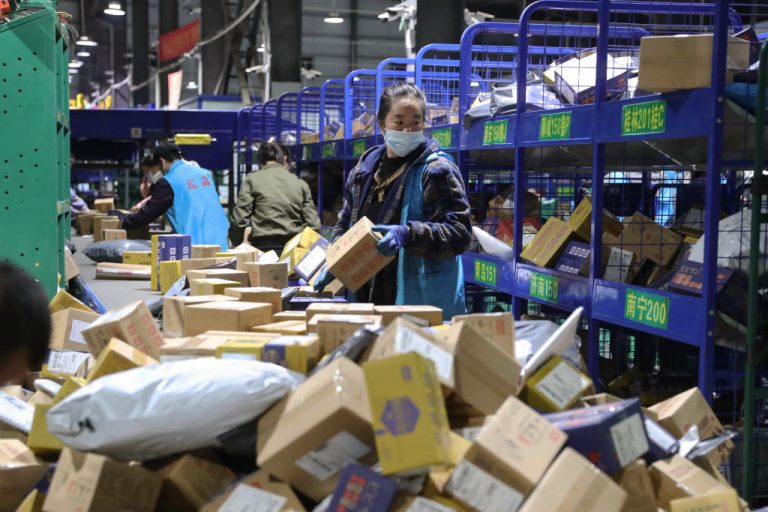A bipartisan bill introduced into the United States Senate that will eliminate an exemption on tariffs for consumer imports with a value under $800 is designed to ensure “reciprocity and increasing transparency at our borders,” a pair of lawmakers says.
Sens. Bill Cassidy (R-LA) and Tammy Baldwin (D-WI) made the statement in a June 14 press release announcing the De Minimis Reciprocity Act of 2023, which was framed with a title that says the stated purpose is to “Stop China from taking advantage of lax U.S. trade laws.”
The bill is also co-sponsored by Sen. JD Vance (R-OH).
Cornell University Law defines de minimis—a legal dictionary term— as “something that is very trifling or of little importance.”
The release explains the arcane title and subject in an easy to understand way: “The de minimis threshold, or the value under which duties are waived, is currently set at $800 for all goods coming into the U.S. This means any import that has a claimed value of less than $800 can enter U.S. markets duty-free and with little customs scrutiny.”
Success
You are now signed up for our newsletter
Success
Check your email to complete sign up
The text of the 12-page bill is especially notable in that it requires the Secretary of Treasury to establish a special account to collect the tariffs captured from the change, which are to be used for the express purpose of “facilitating the movement of manufacturing from the People’s Republic of China to the United States.”
Although the press release and the media hype surrounding the new bill specifically focuses on China, the Russian Federation is also included.
Other countries may have the same penalty applied to them as well.
Included in the text are provisions that goods which are made in the Xinjiang region where the genocide against Uyghur Muslims, which also includes a campaign of slave labor.
Countries which are notorious for counterfeit merchandise and who are lax on human and drug trafficking policy and “terrorism” can also be included, at the Secretary’s discretion.
The move was somewhat foreshadowed by a May 26 article published by The Wall Street Journal, which explained that some 446 million packages from China categorized under the de minimis rule entered the United States in 2021 during the peak of Coronavirus Disease 2019 (COVID-19) lockdown measures.
Second place in the de minimis shipment category by volume was Canada at nearly 65 million items by comparison.
“Even these figures are an undercount because they are based on imports whose shippers voluntarily submitted additional data,” the Journal wrote.
Trade counsel for the Coalition for a Prosperous America, Charles Benoit, explained to the Journal, “If there’s no customs broker involved, then the foreign vendor just makes these assertions” by declaring on the shipping manifest the value of the item and its contents.
Jeff Ferry, an economist for the Coalition, estimated the value of the packages imported from China under de minimis at $188 billion, the article states.
WSJ added that Customs and Border Patrol was only able to seize roughly 1 in 7,000 de minimis packages in 2021, amounting to a little over 115,000 parcels in total.
The article cited Rep. Earl Blumenauer (D-OR) as telling reporters during a May event that CBP is simply “overwhelmed.”
In a video posted to Twitter on May 4 by the account for the House Select Committee on the CCP, Rep. Mike Gallagher (R-WI) took hawkish aim at de minimis imports from mainland China when he said the tariff exemption was never meant to “be a loophole for foreign businesses looking to skirt human-rights legislation and taxes.”
Nonetheless, the U.S. Chamber of Commerce took issue with the Journal’s article in a June 8 post published on its website titled “The Full Picture on De Minimis Imports from China” that claims WSJ made “misleading statements” in its article.
The CBP officially reports that the value of all de minimis goods shipped globally was less than $40 billion in 2021 (the most recent data point), a $144 billion difference from the statistic cited by the Journal’s expert, the Chamber states.
The Chamber of Commerce also construed the notion that de minimis shipments simply aren’t screened, “Further, one would expect a better understanding of customs practices. Despite the column’s assertions, importers are liable for reporting correct information, and de minimis shipments are screened like other goods entering the U.S.,” the article stated.
Earlier in the year, in February, Forbes published an article on the topic, calling de minimis China’s “Free Trade Deal” on the basis that mainland-based clothing company Shein and trinket import resale website Temu “wouldn’t exist here without” the exemption.
“It is a wonder stores like Old Navy, or the baby clothing aisle at Walmart and Target, still exist. SHEIN and Temu will replace them soon enough,” Forbes quipped.
In commenting on the Chinese manufacturing and international sales sector, Forbes said, “Small family stitch and sew factories in China can make a prom dress for $50 and ship it direct to American teens, tax-free, from their tiny home in X’ian, out to New York via the Shanghai International Airport.”
“There’s no need for costly storefronts. There’s no need to pay real estate taxes,” they added.
















